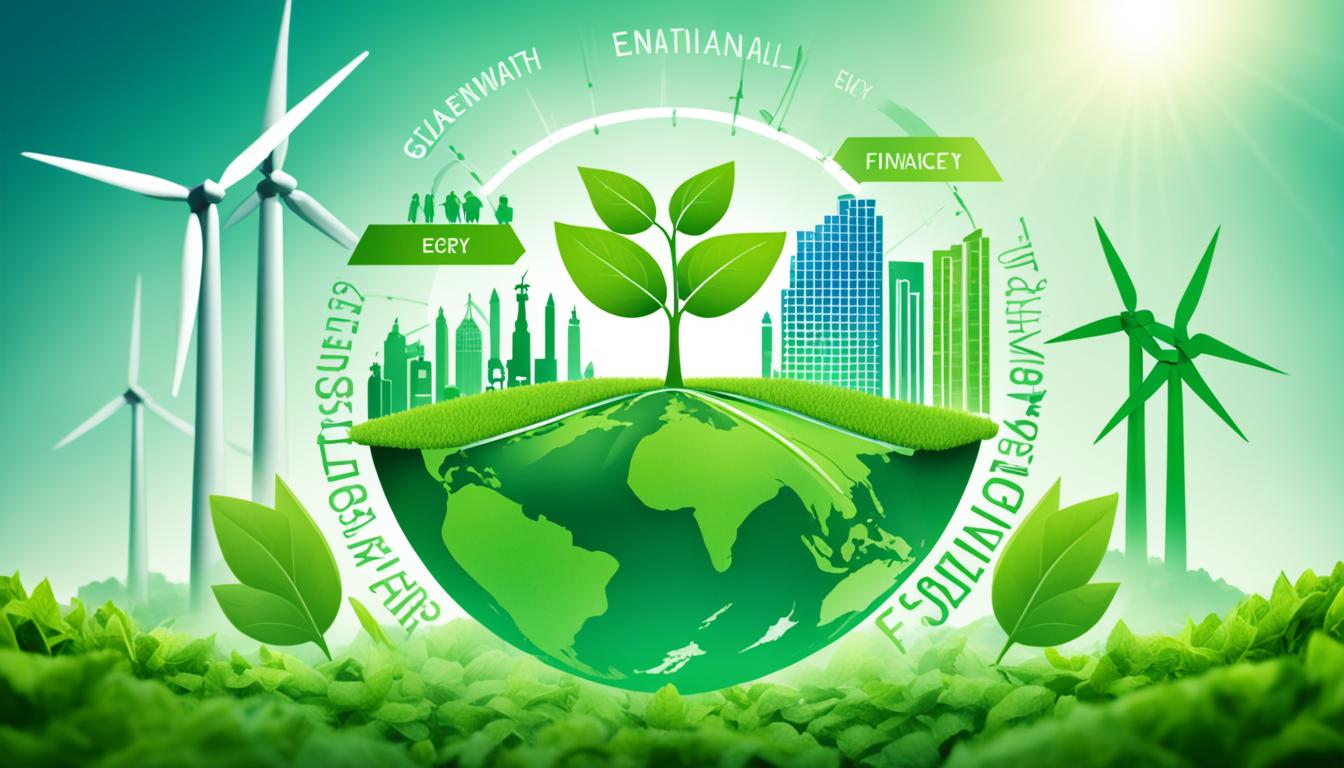The transition to clean energy and environmental progress are essential for combating climate change and safeguarding our planet for future generations. In this article, we will explore the critical role that legal pathways play in advancing clean energy initiatives and advocating for policies that support environmental sustainability.
Legal frameworks provide the necessary structure and guidance for clean energy development, ensuring that projects adhere to environmental regulations and mitigate potential risks. By advocating for clean energy policies and regulations, legal professionals can drive positive change and make a significant impact in the fight against climate change.
Join us as we delve into the world of legal pathways to clean energy and discover how legal expertise can help shape a sustainable future for our planet.
Key Takeaways:
- Legal pathways are crucial in advancing clean energy initiatives and advocating for environmental progress.
- Legal frameworks provide the necessary framework for clean energy development and ensure compliance with environmental regulations.
- Advocating for clean energy policies and regulations is essential for driving positive change and mitigating climate change.
- Legal expertise can help shape a sustainable future by navigating complex legal requirements and addressing environmental challenges.
- By leveraging legal pathways, we can pave the way for a future aligned with environmental sustainability and clean energy access for all.
The Role of an Environmental Law Firm in Clean Energy Transition
As the world increasingly recognizes the need for sustainable energy solutions, environmental law firms play a vital role in facilitating the clean energy transition. With their expertise in environmental law and policy, these firms provide essential guidance and services to individuals, businesses, and organizations involved in clean energy projects. From regulatory compliance to contract negotiations and policy advocacy, environmental law firms offer a wide range of specialized services to support the development and implementation of clean energy initiatives.
One of the key areas of expertise offered by environmental law firms is regulatory compliance. Clean energy projects must navigate through a complex web of environmental regulations and permitting processes to ensure compliance with laws protecting air, water, and land resources. Environmental law firms help clients understand and navigate these regulatory frameworks, assisting with the necessary permits and environmental assessments to ensure that clean energy projects meet legal requirements and minimize their environmental impact.
Contract negotiations are another crucial aspect of clean energy projects where environmental law firms provide invaluable support. These firms help draft and negotiate contracts that protect their clients’ interests and ensure the success and sustainability of clean energy ventures. Whether it’s negotiating power purchase agreements, land leases, or construction contracts, environmental law firms have the expertise to address the unique legal challenges associated with clean energy projects.
In addition to regulatory compliance and contract negotiations, environmental law firms also play a crucial role in litigation support. They have the expertise to represent their clients in legal disputes related to clean energy projects, defending their interests in court and advocating for their rights. This includes representing clients in permit challenges, environmental impact assessment disputes, and other legal proceedings that may arise during the development and operation of clean energy projects.
Furthermore, environmental law firms are at the forefront of policy advocacy, fighting for laws and regulations that support environmental sustainability and the clean energy transition. These firms work closely with policymakers and advocate for the adoption of clean energy policies that incentivize renewable energy development, facilitate energy efficiency programs, and promote a more sustainable future. By engaging in policy advocacy, environmental law firms contribute to shaping the legal landscape and driving systemic change towards a clean energy future.
Ultimately, environmental law firms provide essential legal guidance and services to navigate the complexities of the clean energy transition. Through their expertise in regulatory compliance, contract negotiations, litigation support, and policy advocacy, these firms play a pivotal role in advancing clean energy projects and ensuring their compliance with environmental laws. As the world continues its shift towards a sustainable and clean energy future, environmental law firms will remain instrumental in championing environmental progress and facilitating the transition to a cleaner and more resilient world.
| Services Offered by Environmental Law Firms |
|---|
| Regulatory compliance |
| Contract negotiations |
| Litigation support |
| Policy advocacy |
Overcoming Biodiversity Challenges in Energy Infrastructure Development
The development of energy infrastructure can pose challenges to biodiversity and ecosystems. It is essential to minimize the impact on ecosystems and wildlife during energy infrastructure development. By implementing conservation-oriented solutions, we can mitigate negative effects and protect biodiversity.
Striving for Minimized Impact on Ecosystems
When developing energy infrastructure, it is crucial to prioritize the well-being of ecosystems. Conducting thorough environmental assessments helps identify potential risks and develop strategies for minimizing environmental impact. By implementing sustainable practices and mitigating risks to sensitive habitats, we can achieve a balance between clean energy development and environmental protection.
Implementing Conservation-Oriented Solutions
Implementing conservation-oriented solutions is vital for mitigating the impact of energy infrastructure development on biodiversity. This can include the establishment of protected areas, habitat restoration efforts, and the integration of wildlife-friendly design principles. By considering the needs of ecosystems and biodiversity, clean energy projects can coexist harmoniously with the natural environment.

Engagement and Inclusivity in Environmental Policy Development
Environmental policy development plays a crucial role in shaping a sustainable future and addressing the pressing challenges of our time. To ensure that policies are effective and equitable, it is essential to prioritize engagement and inclusivity throughout the decision-making process. By involving diverse stakeholders and communities, we can harness collective knowledge and foster a sense of ownership and responsibility towards environmental issues.
Community Involvement in Clean Energy Initiatives
Community involvement is key to the success of clean energy initiatives. Engaging with local communities allows for a deeper understanding of their unique needs and concerns, and it paves the way for collaborative solutions. When community members actively participate in the development and implementation of clean energy projects, their expertise and insights contribute to more effective outcomes.
For example, in the city of Springfield, residents were invited to actively participate in the planning and decision-making process for the development of a solar farm. Through open forums and public consultations, residents were able to express their opinions, raise potential concerns, and contribute valuable ideas. This inclusive approach not only helped address community concerns but also strengthened public support for the project.
Furthermore, community-led clean energy initiatives have been successful in driving positive change. Programs such as community-owned solar installations and energy cooperatives empower individuals and communities to take ownership of their energy needs. These initiatives not only promote clean and sustainable energy practices but also foster a sense of stewardship and collective responsibility.
Reducing Inequality Through Equitable Policy Design
One of the key goals of environmental policy development is to address social and economic disparities. By prioritizing equity and ensuring that policies benefit all members of society, we can reduce inequality and create a more sustainable future for everyone.
Equitable policy design involves considering the social and economic impacts of environmental initiatives. It means providing equal access to clean energy resources, job opportunities, and economic benefits, particularly for marginalized and underserved populations. By incorporating principles of environmental justice and fairness, we can create a more inclusive and sustainable society.
For instance, in the state of California, the Low-Income Home Energy Assistance Program (LIHEAP) aims to reduce energy poverty and provide energy bill assistance to low-income households. This program ensures that vulnerable communities have access to affordable and clean energy, helping to alleviate the burden of high energy costs and promoting social equity.
By designing policies that address the unique needs of different communities and prioritize equitable outcomes, we can reduce inequality and ensure that the benefits of the clean energy transition are shared by all.
| Benefits of Engagement and Inclusivity in Environmental Policy Development |
|---|
| 1. Diverse perspectives lead to more robust and effective policies. |
| 2. Community involvement builds trust and fosters support for clean energy initiatives. |
| 3. Inclusive policies reduce social and economic disparities. |
| 4. Community-led initiatives empower individuals and strengthen local communities. |
| 5. Equitable policy design promotes environmental justice and addresses systemic inequalities. |
Advancing Sustainable Business Practices Through Legal Guidance
Businesses play a crucial role in driving the transition to a sustainable future. To achieve this, they need legal guidance that can help them navigate the complexities of environmental regulations and incorporate clean energy solutions into their operations. Sustainable business practices not only benefit the environment but also enhance brand reputation and attract socially conscious consumers.

Legal experts specializing in environmental law can provide valuable guidance to businesses in developing and implementing sustainable practices. They can assist in ensuring compliance with environmental regulations, advocating for renewable energy adoption, and mitigating legal risks associated with sustainability initiatives. With the right legal guidance, businesses can align their operations with environmental goals and contribute to a more sustainable future.
“Sustainable practices are no longer just a choice, but a necessity for businesses. Legal guidance ensures compliance with regulations and helps companies implement environmentally responsible strategies that benefit both the planet and their bottom line.” – [Insert Expert Name], Environmental Lawyer
Furthermore, legal frameworks play a significant role in supporting sustainable business practices. They provide the foundation for establishing corporate social responsibility initiatives and promoting accountability in environmental stewardship. By adhering to legal requirements and integrating sustainability into their core business strategies, companies can demonstrate their commitment to environmental responsibility and gain a competitive edge.
Below is a table showcasing the key ways in which legal guidance supports sustainable business practices:
| Benefits of Legal Guidance for Sustainable Business Practices |
|---|
| 1. Ensuring compliance with environmental regulations |
| 2. Guiding the integration of clean energy solutions |
| 3. Mitigating legal risks associated with sustainability initiatives |
| 4. Advocating for renewable energy adoption |
| 5. Establishing corporate social responsibility initiatives |
| 6. Promoting accountability in environmental stewardship |
By leveraging legal guidance and incorporating sustainability into their operations, businesses can play a pivotal role in driving positive environmental change. With the support of legal experts, they can navigate the legal landscape, adopt clean energy solutions, and contribute to a more sustainable and resilient future.
Legal Solutions for Environmental Issues
Addressing environmental issues requires the implementation of legal solutions that promote sustainable development and mitigate the negative impacts of human activities on the environment. In this section, we will explore two key legal approaches for tackling environmental challenges: strengthening laws for faster renewable energy adoption and redressing disparities with energy equity principles.
Strengthening Laws for Faster Renewable Energy Adoption
Accelerating the transition to renewable energy is crucial for combating climate change and reducing reliance on fossil fuels. To achieve this, it is essential to strengthen and update existing laws and regulations. Here are some key legal strategies for promoting renewable energy adoption:
- Streamlining permitting processes: Simplifying and expediting the approval process for clean energy projects can encourage investment and facilitate their timely implementation.
- Providing financial incentives: Offering tax credits, grants, and other financial incentives to renewable energy developers can help offset the initial costs and promote the growth of clean energy industries.
- Establishing renewable energy standards: Setting ambitious renewable energy targets and mandating a specific percentage of clean energy in electricity generation can drive the adoption of renewable energy technologies.
By enacting supportive policies and regulations, governments can create an enabling environment that fosters the rapid growth of renewable energy and accelerates the transition away from fossil fuels.
Redressing Disparities with Energy Equity Principles
Energy equity aims to ensure that all communities have equal access to clean energy resources and the benefits they provide. By addressing disparities in energy access and affordability, energy equity can promote social, economic, and environmental justice. Here are some key legal principles and strategies for advancing energy equity:
- Addressing environmental justice concerns: Recognizing and addressing the disproportionate environmental burdens faced by marginalized and underserved communities is crucial for achieving energy equity.
- Advancing social equity through legal frameworks: Designing and implementing policies and regulations that prioritize equitable access to clean energy resources, job opportunities, and economic benefits can help redress disparities.
By incorporating energy equity principles into legal frameworks and regulations, we can create a more inclusive and sustainable energy system that benefits all members of society.
Green Initiatives Legal Support and Their Benefits to Society
Green initiatives, such as clean energy policies and sustainable development projects, can bring significant benefits to society. The legal support needed for these initiatives plays a crucial role in fostering a sustainable and inclusive society.
Fostering Public Health with Clean Energy Policies
Clean energy policies have a direct impact on public health. By reducing air pollution and improving indoor and outdoor air quality, these policies contribute to the overall well-being of individuals and communities. The implementation of clean energy initiatives supported by legal frameworks can promote cleaner and healthier environments, leading to improved public health outcomes.
Sustainable Economic Growth Linked to Environmental Legislation
Environmental legislation plays a key role in promoting sustainable economic growth. Legal frameworks that incentivize green innovation and create job opportunities in clean energy sectors contribute to the development of a thriving and resilient economy. By harmonizing environmental protection with economic development, environmental legislation can drive long-term prosperity while ensuring the sustainable use of resources and protection of the environment.
Navigating Environmental Regulations Compliance
Compliance with environmental regulations is crucial for businesses and organizations to ensure environmental protection and promote sustainable development. Navigating the complex landscape of environmental regulations can be challenging, but with the right guidance and legal counsel, organizations can ensure compliance and mitigate legal risks.
Environmental regulations encompass various aspects, including permit requirements, environmental assessments, and reporting obligations. Understanding and fulfilling these requirements are essential for maintaining environmental standards and avoiding penalties or legal disputes.
When navigating environmental regulations compliance, legal counsel plays a vital role. Legal experts can provide guidance on interpreting and adhering to regulations, helping organizations understand their obligations and develop strategies to achieve compliance effectively.

| Benefits of Navigating Environmental Regulations Compliance |
|---|
| 1. Avoidance of penalties and legal risks |
| 2. Protection of the environment and natural resources |
| 3. Enhanced reputation and public trust |
| 4. Opportunity for sustainable development and responsible business practices |
| 5. Alignment with corporate social responsibility goals |
By maintaining compliance with environmental regulations, organizations can protect the environment, contribute to sustainable development, and build a positive reputation. It is crucial to prioritize environmental stewardship and seek legal counsel to navigate the intricate landscape of environmental regulations effectively.
Climate Change Legal Counsel: Shaping the Future of Energy
Climate change presents unique legal challenges that require specialized expertise. Legal counsel plays a crucial role in shaping the future of energy by navigating the complex regulatory landscape, advocating for climate change mitigation policies, and driving systemic change.
Regulatory Strategies for Reducing Carbon Footprint
Reducing carbon footprints and mitigating the impacts of climate change require effective regulatory strategies. Legal frameworks play a crucial role in implementing regulations that promote carbon reduction, such as emissions trading schemes, renewable energy targets, and energy efficiency standards. Legal counsel can provide guidance on navigating these frameworks, ensuring compliance, and driving sustainable practices.
Legal Advocacy for Climate Change Mitigation
Legal advocacy is vital for driving climate change mitigation efforts. Legal professionals play a key role in advocating for climate-friendly policies, supporting renewable energy development, and holding polluters accountable. Through climate change litigation and strategic legal advocacy, they contribute to shaping the future of energy and promoting a sustainable and resilient future.
Conducting Environmental Impact Assessments for Clean Energy Projects
Conducting environmental impact assessments (EIAs) is a crucial step in ensuring the sustainability of clean energy projects. These assessments evaluate the potential environmental risks and impacts associated with such projects, allowing for the implementation of appropriate mitigation measures. Furthermore, conducting EIAs is often a legal requirement to ensure compliance with environmental regulations.
EIAs involve a comprehensive evaluation of the project’s potential effects on various aspects of the environment, including air quality, water resources, biodiversity, and ecosystems. By identifying and assessing these potential impacts, legal experts can provide valuable insights to project developers, helping them address environmental concerns and minimize their project’s footprint.
“Conducting environmental impact assessments is not only a legal obligation but also an opportunity to ensure that clean energy projects are developed in a manner that safeguards our environment,” says Jane Mitchell, an environmental lawyer with extensive experience in renewable energy projects. “By thoroughly assessing potential risks and implementing proper mitigation measures, we can create a sustainable future powered by clean energy.”
Legal experts play a crucial role in conducting thorough EIAs. They possess the knowledge and expertise required to navigate complex environmental regulations and ensure compliance throughout the assessment process. By working closely with project developers, environmental consultants, and relevant stakeholders, legal experts can help evaluate the environmental impacts of clean energy projects and develop effective mitigation strategies.
Eco-Friendly Legal Advisors: A Necessity for Renewable Energy Projects
Eco-friendly legal advisors play a vital role in supporting renewable energy projects and ensuring compliance with environmental regulations. Their expertise and guidance are essential for navigating the complex legal landscape associated with clean energy initiatives. From the early stages of project development to the successful implementation of renewable energy projects, the involvement of eco-friendly legal advisors is crucial.
Importance of Early Legal Involvement
Early legal involvement is critical for the success of renewable energy projects. By engaging legal advisors from the outset, stakeholders can ensure that legal considerations are integrated into project planning and implementation. This includes identifying legal requirements, assessing potential risks, and developing strategies to address legal challenges.
“By involving legal advisors early on, businesses and organizations can proactively identify and address potential legal issues, minimizing the risk of delays and costly disputes.”
Legal advisors can assist with various aspects of project development, such as permit applications, contract negotiations, and land acquisition. Their early involvement allows for proactive measures to be taken, ensuring compliance with legal requirements and mitigating potential obstacles that could hinder the progress of the renewable energy project.
Ensuring Compliance and Fostering Trust in Transition
Compliance with environmental regulations is crucial for the successful and sustainable transition to renewable energy. Legal advisors specializing in eco-friendly practices can help project developers navigate the complex regulatory landscape, ensuring adherence to all applicable laws and regulations.
Moreover, eco-friendly legal advisors can address stakeholder concerns and build positive relationships with communities. Their expertise in environmental law and sustainability allows them to advocate for transparency, accountability, and a fair representation of the interests of all parties involved.
By fostering trust and maintaining the integrity of the renewable energy transition, legal advisors contribute to the long-term success and acceptance of clean energy projects. They play a critical role in ensuring that projects are undertaken in an environmentally responsible manner, helping to establish a transparent and accountable renewable energy sector.
| Benefits of Eco-Friendly Legal Advisors in Renewable Energy Projects | |
|---|---|
| 1. Early identification and addressing of legal issues | |
| 2. Guidance in compliance with environmental regulations | |
| 3. Assistance with permit applications and negotiations | |
| 4. Building trust with stakeholders through transparency | |
| 5. Advocacy for sustainability and environmental responsibility |
Conclusion
In conclusion, legal frameworks are instrumental in driving environmental progress and advancing clean energy initiatives. Throughout this article, we have explored a range of legal solutions and strategies that can help overcome challenges and promote sustainable development. By leveraging these legal pathways, advocating for clean energy policies, and fostering inclusivity and engagement, we can pave the way for a future that is aligned with environmental sustainability and ensures equitable access to clean energy resources for all.
Legal frameworks provide the necessary structure and guidance for clean energy development. They enable the establishment of regulations, policies, and standards that support the adoption of renewable energy sources and the reduction of carbon footprints. With the right legal frameworks in place, we can accelerate the transition to clean energy and mitigate the impacts of climate change.
Moreover, legal advocacy plays a pivotal role in driving change and advocating for environmental sustainability. By engaging legal professionals, stakeholders can navigate the complex landscape of environmental regulations, address legal challenges, and drive systemic change. Legal advocacy empowers individuals, businesses, and organizations to stand up for the environment and work towards a more sustainable future.
Ultimately, the integration of legal frameworks and clean energy advocacy is crucial for achieving our collective goal of a greener and more sustainable planet. By harnessing the power of the law, we can create a future where environmental sustainability and clean energy access are prioritized, leading to a healthier planet and a better quality of life for future generations.
FAQ
What role do environmental law firms play in the clean energy transition?
How can the impact on ecosystems be minimized during energy infrastructure development?
What are conservation-oriented solutions in the context of energy infrastructure development?
Why is community involvement important in clean energy initiatives?
How can policies promote equity in the clean energy transition?
How can businesses implement sustainable practices with legal guidance?
What role do legal solutions play in addressing environmental issues?
How can governments accelerate renewable energy adoption through laws and regulations?
Why is compliance with environmental regulations important?
What is the role of climate change legal counsel?
What is the purpose of conducting environmental impact assessments for clean energy projects?
Why is early legal involvement critical for renewable energy projects?
How can eco-friendly legal advisors ensure compliance and foster trust in the renewable energy transition?
Source Links
- https://www.nrdc.org/press-releases/nrdc-report-recommends-new-pathway-clean-energy-permitting-reform
- https://www.eli.org/sites/default/files/files-pdf/deepdecarb_front_matter.pdf
- https://www.ucsusa.org/resources/clean-energy-transformation



